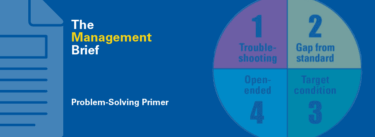In normal times, on a normal day, millions of memories are facilitated by foodservice workers: romantic rendezvous in restaurants, boisterous brouhahas in bars, and career-defining meetups in coffee shops. The industry uplifts the human experience. More importantly, it enables the livelihoods of millions of workers and their families.
Unless it can’t.
In the United States, since the beginning of 2020, food industry staffing is lower by more than two million people from its pre-pandemic level of 15 million; more than 110,000 restaurants, which is one out of six, have closed; and, according to the National Restaurant Association, 40% of the remaining operators say they are unlikely to stay in business through the winter without additional relief. The problem feels overwhelming.
Governments could help because the cause of these closures is beyond the operators’ control. But sufficient help may not be forthcoming. So, the practical question is, what can the surviving operators do now that’s within their scope of control? (A good question for anyone at any time, really.)
Lean Thinking for Operations Is not Enough
As you may know, both of us, Karen and Josh, spent decades working in the industry. We were employed by Starbucks for many years, where we met and were introduced to lean thinking and practice. More recently, we have been sharing that learning with companies like Legal Sea Foods, a well-known and highly regarded restaurant group based in Boston, MA.
Since the beginning of 2020 more than 110,000 restaurants, which is one out of six, have closed; and, according to the National Restaurant Association, 40% of the remaining operators say they are unlikely to stay in business through the winter without additional relief.
Working in industry is a mixed experience. We’ve loved it! And we’ve hated it. Creating memorable experiences around food can be exhilarating. It’s also damn hard and extremely variable work. It requires creativity and discipline, individual hustle, and choreographed teamwork. It’s filled with blissful moments of rhythm and flow, but also, epic catastrophes when customer needs emerge faster than they can be met, and mise en place goes to hell.
(If you’re unfamiliar with the term, mise en place is the practice of stocking and organizing a workstation, and prepping all needed ingredients before cooking to fulfill orders. It’s sort of a cross between 5S and kitting. Yet unlike those lean practices, mise en place is rarely maintained. Instead, everything gets consumed, leaving a workstation with a mix of empty containers, unused ingredients, and general disorganization.)
Our personal experiences with “lean-n-food” have been primarily in operations. We learned to see from the customer’s perspective, to identify waste (most notably overproduction which runs rampant, even in an industry with fresh products, and adds significant costs, contributing to its notoriously thin margins– 40% of food production goes to, literally, waste), to design work for rhythm and flow, and to leverage these insights for better products, service, and layouts in the front of house (e.g. dining area) and back of house (e.g. kitchen).
But the two of us are not practicing lean thinking for food now, when the entire industry is having to rethink fundamental questions of purpose and what is value and restructure entire supply chains and operations accordingly.
Lean Thinking on Purpose
That’s why this past spring we assembled an international group of industry leaders who are lean practitioners. These pioneers have been exploring how to respond to the catastrophic effects of the coronavirus pandemic. They’ve been sharing what they’re learning with each other, and on multiple occasions, we’ve brought their stories to those who are interested. At a time of accelerated and fundamental change throughout the industry, we see this as an opportunity to share lean thinking and practice with the operators leading this transformation. More so than ever, we hope, they will be open to hearing new, and sometimes radical, ideas.
As we’ve listened, we’ve been in awe of how this group is thinking and acting differently. In some cases, they’re reimagining the purpose of their business. For example, when indoor dining is prohibited, enhancing social gatherings is not applicable. So, to stay in business and keep their folks employed, they’ve shifted to something more fundamental, like providing basic nourishment conveniently. While that may be less exciting than creating the perfect environment for a bachelorette party, it meets an important basic necessity.
We’ve also heard them reconsidering the customer perspective. How have the needs of customers changed? What new value, then, should they create? What could no longer be provided, because doing so would be unsafe, and what’s no longer wanted? Answers to these questions have brought dining rooms outdoors, reduced menus to high-selling comfort foods only, and focused everyone on handoffs when close contact is inevitable, eliminating as many as possible and making those that remain as brief as possible.
And they’re reimagining the work, framing concrete problems, and experimenting with this and that lean idea. For example, they’ve told us about studying the flow of customers, workers, and the food, looking for instances of stagnation when exposure to the virus is increased. And there were other examples. In the face of an existential crisis, their ingenuity is inspiring!
In fact, the group isn’t limited to restaurants only, but includes the entire value stream: farm to grocer to mail order to table. Previously, Josh reported on Lean Farmer Ben Hartman’s shift from supplying restaurants to a direct-to-customer business, and how Ben used the flexibility he’d built into the operation to change everything over in one week! Talk about pivoting a business!
The transformation of many businesses in the industry, and of the entire food industry, has already begun. Thousands of experiments are underway. The next 12 months will be game changing.
Lean Thinking for a Better Tomorrow
We have questions: What’s been learned over the past nine months and what will be learned over the next nine that will come to redefine the norms of the industry? What’s been discovered, if anything, that could grow the industry’s notoriously thin margins? How can food businesses become more resilient, and less susceptible to externalities? Will they once and for all disregard the industry mantra (of overproduction), “Stack ‘em high and watch ‘em fly?” (It takes people and time to “stack ‘em” after all. What happens when they don’t “fly,” i.e., sell?)
Our Lean-n-Food team of professionals are reimagining the work, framing concrete problems, and experimenting with this and that lean idea.
Even more fundamentally, what is a restaurant in the post-pandemic world? Will everything return to normal, with restaurants helping us all create wonderful new memories in their dining rooms? Or will takeout and delivery be the new normal? Have we all rediscovered the joys of cooking?
Because of questions like these, we’ll be staying in touch with these food industry leaders, and we’re recruiting more. For that, we could use your help. Throughout 2021, we plan on bringing you stories of reinvention. We’ll refer to this series as Lean-n-Food, and look forward to reporting on an industry’s rebirth. Please, let us know of food industry stories and learning to share and we’ll be honored to pass them on. In the meantime, do what you can to support the businesses fighting to hang on. Their workforce has helped you create memories over the years. Now’s a good time to return the favor.
Virtual Lean Learning Experience (VLX)
A continuing education service offering the latest in lean leadership and management.







